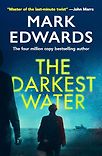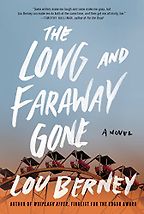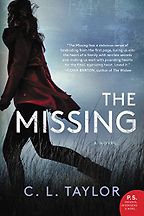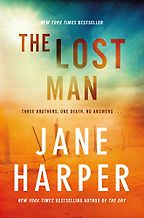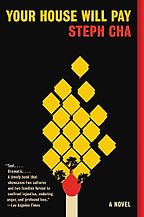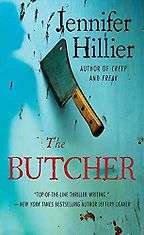Thank you for recommending five of the best contemporary mystery books. You have sold more than 4 million books since your first novel came out in 2013, so I suspect you have a pretty good sense of the ingredients required for a good story. What do you look for, personally, in a mystery book?
I read so many mystery books and psychological thrillers that they all tend to merge into one. So, these days especially, I’m looking for something that stands out from the norm—whether that’s an unusual setting, a plot twist we haven’t experienced before, or a different kind of viewpoint. Or just a really great hook, like a very intriguing puzzle, that makes you wonder how on Earth the author is going to unravel this problem they’ve created for themselves. I’ve done that myself sometimes—started a book with a seemingly impossible puzzle, without actually knowing how to solve it. Then I’ve figured it out as I’ve gone along.
I’m very good at guessing twists, because when you write these books you know all the tricks the author is using. But some of the books I’ve chosen completely blindsided me, and I didn’t see the reveal coming, or I was just surprised by the direction the story went in.
Sounds great. I suppose mystery writers have to be expert manipulators of human psychology, and play with the reader’s attention and expectations.
Yes, it’s a craft, like being a magician: you’ve got to be able to use red herrings, misdirect. You’ve got to get the pacing right, too. You can’t reveal things too slowly or too quickly. I think that’s part of the skill of being a crime writer—being able to withhold just the right amount of information. Without cheating, you have to subtly lead people in the wrong direction. Then, when you get to the end and everything is revealed, it’s very important that it doesn’t feel like it just came out of the blue; if they read the book again, they should be able to see—ah, that’s where the writer fooled me, that’s where they sent me off in the wrong direction.
Sometimes you’ll read mystery books that are so fast-paced and spin off in so many directions that you feel so exhausted by the end that you don’t even want to go back to work out whether what you’ve read made any sense at all. Maybe that doesn’t matter, if you really enjoyed it! But I think the best books are the ones where you can read them a second or third time and see what the writer was doing.
I’ve published 18 novels now, and written various others that didn’t get published. But every time I start, I feel like I’m learning how to do it all over again. That’s the big challenge, but it’s also what makes it so fun.
It does sound fun. Shall we talk about the contemporary mystery books you’ve chosen to recommend? Let’s start with Lou Berney’s The Long and Faraway Gone, which came out in 2015. It looks at the reverberations of past crimes. What do you admire about it?
This is my favourite crime novel of the last ten years. Maybe the last twenty years. It’s an extraordinary book.
It has two parallel narratives. One starts with a gun massacre in a movie theatre, the other with a teenage girl going missing at the Oklahoma State Fair. Both of these events happen in the summer of 1986. Where the girl went, and who was responsible for the shooting, are both mysteries that have never been solved. Twenty years later, the sole survivor of the shooting and the sister of the missing girl are both obsessed with these two events from their past.
The survivor of the shooting is now a private investigator. He’s trying to put it behind him, but it weighs very heavily on his subconscious. He finds himself back in Oklahoma while investigating another case, and is drawn back into trying to figure out what happened that night and who was responsible. At the same time, you have the story of this woman who’s been obsessed with finding out what happened to her older sister, and has spent those twenty years searching but has never got anywhere. She suddenly gets a small breakthrough in the case.
“Mystery writing is a craft, like being a magician: you’ve got to be able to use red herrings, misdirect”
The genius of this book—and this is a massive spoiler—is that these two parallel narratives run alongside each other without ever converging. The characters never meet each other, although they are both there in Oklahoma, happening at the same time. So they’ll go to the same place, they might bump into the same person, or make a similar observation about something in Oklahoma. But the stories interlock only thematically, rather than in terms of plot, which is so unexpected. All the way through you’re thinking, ‘This has got to intersect at some point. The answer to the crimes in one person’s story must be found in the other’s.’ I won’t give away the resolution.
I will say that this book won loads of prizes in the US—all the big crime writing prizes—but I don’t think it sold particularly well, maybe because it’s too complex or difficult to explain. But it deserves a huge audience because it’s so well written, so absorbing, so accessible.
His later book, November Road, was a bigger hit. That’s brilliant too, but I think this is his masterpiece.
I suppose, for a mystery writer, there must be a constant tension between creating a book that’s satisfying to the reader in the expected way, but also doing something new and unusual in literary terms.
This is a very unusual book, and I would imagine that some people would find some elements of the book unsatisfying because things are not neatly tied up—some new mysteries spring out of what the main characters discover as they go along. Really the book is more about learning to lay to rest the ghosts of the past, to move on from terrible things that have happened to you, or the people you’ve lost. Rather than the typical crime novel resolution where the bad guy gets caught and either killed or put in prison and justice is done. The Long and Faraway Gone doesn’t have that kind of ending, and—as I said—I’m always looking for something different, so I think that’s one of the reasons why it really appealed to me.
From an artistic point of view, I really like books with an open ending. I write books with open endings myself, because I like the reader to be able to imagine what’s going to happen next. I think that lingers longer in the mind.
The second contemporary mystery book you’ve recommended is The Missing by C. L. Taylor. It’s been out since 2016. It’s also about a missing teenager.
This is a much more straightforward narrative, mostly from the viewpoint of his mother. A 15-year-old boy goes missing in the middle of the night. Six months on, no one has managed to figure out where he has gone. This is a classic missing-person narrative: all the trails have led nowhere, all the trails have gone cold. What we find out as we meet his family is that they’ve all got secrets and they’re all feeling guilty about something. They’re all blaming themselves for the disappearance.
Threaded through the narrative are these online exchanges between two people with typical anonymous usernames, so you don’t know who they are. C. L. Taylor does a great job of using these conversations—where you’re not exactly sure who is talking or what they are talking about—to throw you off the scent and keep you intrigued.
One of the things I really loved about this book is that it’s got a really powerful and emotional ending. I’m trying not to give anything away, but I completely didn’t guess what the truth was. And it’s so believable, there’s nothing far-fetched, you don’t have to suspend your disbelief. You can see this happening in real life. It’s a long book, about 500 pages, and the way she leads you through it is so skilfully done. It’s a great example of a missing-person thriller where things are resolved, and in a way where 99% of readers won’t guess the ending.
That sounds excellent.
It’s really, really good. I’ve read all of her books and I think this is still my favourite one.
I’ve seen this book described elsewhere as a ‘psychological thriller,’ and I’ve seen your own writing characterised that way too. Do you see a distinction, or are these overlapping terms?
I’d say they overlap. I tend to think of psychological thrillers as a type of domestic suspense. The main character tends not to be a detective or a private investigator. They’ll be an ordinary person who has found themselves in some kind of situation—maybe a mystery, like a missing family member or they suspect their in-laws might have been murdered. Something like that. Gone Girl and Girl on the Train are probably the best-known examples of psychological thrillers.
In Gone Girl, you’ve got a toxic marriage, and you see it through the points of view of both the husband and the wife. You know that something terrible has happened, but you’re not really sure what. In Girl on the Train, you’ve got someone who thinks they’ve witnessed a crime, and they’re trying to figure it out.
These are different from detective novels or police procedurals in that they feature ordinary characters. They don’t have to feature psychologists or show deep psychological insight—or not on the surface, anyway—but it’s always there.
Get the weekly Five Books newsletter
The other interesting thing in The Missing is that the main character, Claire, keeps slipping into fugue states. There are bits in the book where she wakes up with no idea what has happened, where she’s been, or what she’s done. So that adds an extra layer to the mystery. The character and the reader don’t know what she’s done, and it makes you wonder whether she is the one with responsibility for her son’s disappearance.
I love an unreliable narrator. Let’s move on to our third contemporary mystery book recommendation, which is The Lost Man by Jane Harper. It’s her third novel, and it came out in 2018.
This is Jane Harper’s best book. I think most people who’ve read her work agree The Lost Man is her best book. It’s standalone, so not part of the Aaron Falk series with The Dry and Force of Nature.
But, like those books, it’s also set in the Australian bush.
Jane Harper has made ‘Outback noir’ really popular in the last few years; I mean, she started it.
This book is about three brothers who grew up in the outback, a very remote part of Queensland. They are cattle farmers who own this huge piece of land. One of the brothers is found dead by a landmark called ‘the stockman’s grave’—it’s a gravestone out in the middle of nowhere, and his car is parked a long way away, so he must have had to crawl or walk for a long time to find this grave. No one knows who the stockman was, or how long it’s been there. So the mystery is: Was it suicide, or was he murdered and someone left his body out there? The main character, one of the brothers, sets out to unpack what happened in his brother’s life over the previous months. In doing so, he uncovers all these family secrets.
The great thing about this book is the setting, it’s so atmospheric. You can really feel the blazing, scorching heat of the Queensland sun. It all feels very dry and dusty. And, again, this is a book where the ending really took me by surprise. It’s perfect! So cleverly done, so well thought through. It’s the kind of book where you think she must have started out knowing the ending, then worked it all out. Not like she stumbled her way there, like a lot of us do. It’s a very, very clever twist. It’s a really beautifully written, clever crime novel.
I’m really interested in the plotting process. How do you approach it? Do you write and write, and after a while the shape becomes clear? Or do you map it all out before you put pen to page?
I write in a very inefficient way. I tend to know the set-up—the opening, the inciting incidents, I know what the main mystery is going to be. I’ll think about who the main characters are, and I’ll always have a few key scenes in my head, which I know are going to happen at some point. But otherwise, I just write and discover it as I go along. This tends to mean I have to do a lot of drafts. For example: I just finished writing a book that I had to write almost from scratch the second time I wrote it because, apart from maybe the first 10,000 words, I threw away the whole rest of the book. I had to write those 80- or 90,000 words again. So, basically, I wrote two books. If I could get it right first time, I could write twice as many books, or have twice as much time off. But I get there.
Well, you’ve managed to publish a great number of books, so it can’t be that inefficient.
It’s a tried and tested process. I write quickly, I don’t allow myself to sit and get stuck, I just plough on, even knowing that I might have to delete it. So, yes, I never know how it’s going to end, and I often rewrite the ending several times, even when I think I’ve finished. Or I’ll think of a much better twist, which will involve going back and rewriting a whole thread that runs through the book. I have tried plotting it out, and I just can’t do it. The words have to be in the character’s heads for me to be able to figure out the story and the scenes.
While we’re talking about your own work, could you tell us about your latest book, No Place to Run?
My main character, Aidan, is British but lives in Seattle. His younger sister came to stay with him, and a few days into the trip she disappeared. Now, two months have passed, and he gets a call from a woman who was on the Coast Starlight, a real train that runs from Seattle to L.A. and back—which I went on, to research this book, which was fantastic—and looking out the window at the break of dawn, when everyone else was asleep, she saw a young woman being chased across a forest clearing by a man. The disappearance of Aidan’s sister, Scarlett, has been a massive news story, and this woman is certain that she recognised her.
So he travels down to northern California, where this sighting was made, but without much hope, and very sceptical about whether this woman really did see his sister. He goes to a small town near to where she was sighted, and starts asking questions. It’s a fish out of water story—he’s British, he’s never used a gun, he’s a mild-mannered software engineer, but he finds himself in a Lee Child novel, basically, with all these bad guys after him and scary goings-on in the forests of California.
There are crazy, extremist eco-warriors who may or may not have something to do with what happened to Scarlett. You’ve got corrupt cannabis farmers, weird things going on in the Mojave Desert. Basically, there are all these action elements, which is not typical of my books—it’s less of a psychological thriller, and more of an action thriller. I wanted to write something a bit different this time. It’s more like Lee Child meets Harlan Coben, but with an everyday British character at its centre. It’s a very fast-paced book with a cast of thousands, with lots going on on every page.
That sounds exciting. Was it fun to write?
It was hard to write, in as much as I kept having to rewrite it. I got a third of the way in, where there’s a big confrontation between the good guys and the bad guys, which changes everything. I couldn’t work out exactly what should happen after that, the end of Act One. I kept writing and re-writing it, changing my mind. But it was particularly good fun to research; I went out to north California, took the train to Seattle, drove around and took a lot of photos. These are the places where the book takes place. That was just before the pandemic—I got there just in time before everything started shutting down. So yes, it was a lot of fun to research.
Let’s talk about the fourth contemporary mystery that you’ve chosen to recommend: Your House Will Pay by Steph Cha. It’s an award-winning novel inspired by the real-life slaying of Latasha Harlins, an African American girl who was shot dead in 1991.
That’s right. This book is set in Los Angeles, and a bit like the Lou Berney book, it’s got two narrators and two different timelines. So, it’s half set in 1991 during the Los Angeles riots—when a 15-year-old black girl is shot dead by a Korean shopkeeper who thought the girl was stealing. Steph Cha, who is Korean-American, has taken the story of Latasha Harlins’s death and fictionalised it, using the crime novel to look at race in LA. It was published in 2019, but still feels very, very timely, because the other timeline in the book, in the present-day, features a police shooting of a black man in LA, and tensions rising again in the community, just like they did in 1991. It feels like something is about to kick off at any moment.
A Korean woman is shot outside of the store that she runs, and it turns out it’s the same woman who, 20 years ago, shot this Black girl in her shop and got a very lenient prison sentence. Within a few years, she’s out of prison, changed her name, and is basically back living in the same community. People didn’t know who she was, but someone has found out and has murdered her. So the book is basically about the tension between these two communities, seen through the eyes of a Korean family and a Black family, set against the backdrop of racism in America and police brutality.
It takes on a lot of very serious issues, and does it well—so well, so cleverly, and with a light touch that makes it very enjoyable to read. It sounds like a very serious, dark book, I know, but the experience of reading it isn’t. It’s really entertaining, and very emotional, because you’ve got the children of these adults involved in crimes of the early 1990s, having to cope with the sins of the father—or the sins of the mother, in this case—and the repercussions of everything that happened between their families years ago.
As you said, this was a prize-winning novel. I don’t know if it was a big commercial hit, but it’s one of those books that other crime writers read and rhapsodise about, because it’s so well done, so well-written.
That sounds amazing. It’s not a book I’d come across before, so thank you for bringing it to my attention. Your final contemporary mystery novel recommendation is Jennifer Hillier’s The Butcher, published in 2014.
This is a bit different. It’s much darker than the other books, but with a dark humour too. It’s a serial killer novel, not a gentle mystery—it’s very nasty. But it’s written with so much wit, and a kind of taboo-busting verve. I really loved it.
It’s about a retired police chief who, 20 years ago, apparently hunted down and killed a serial killer who had been terrorising Seattle. He got all these plaudits, awards, medals. Everyone thinks he was a great hero. Now he’s moving out of his home into a retirement home, and his grandson, who he raised, moves into the house. While doing some work in the garden the grandson finds these crates buried under the lawn—cases of human hands. Severed human hands, still with nail polish on, things like that. He starts to think: Oh my god, what if my granddad was actually the serial killer, shot an innocent man to frame him, then stopped the killing? You find out very early on in the book that, yes, this is actually the case. So it’s not a whodunit, it’s about what happened, and whether he’s going to get away with it. Which to me is really interesting.
Much of the book is told through the eyes of this 80-year-old serial killer, who is one of the most horrible characters, an ageing Patrick Bateman—but with more self-awareness. He’s in this retirement home full of sweet old ladies, and he causes absolute havoc. There are some very dodgy sex scenes in this book, which you read thinking: ‘oh my god, I can’t believe this.’
Five Books interviews are expensive to produce. If you're enjoying this interview, please support us by donating a small amount.
What drives the book is that the grandson’s girlfriend has always believed that her mother was murdered by this same serial killer, but the murder happened two years after the serial killer had apparently been caught. So she’s investigating, and she starts to suspect the old guy. He gets wind of it, and that obviously puts her in great danger. The grandson has divided loyalties, but he’s starting to suspect that his beloved granddad is a psychopath. It’s so deliciously done. You as the reader know what’s going on, kind of, and you want to warn them.
And, I should say that I know the writer. Jennifer is so lovely, a mild-mannered person. People say this to me as well: How do you think of this? Where does this dark stuff come from? It shows how crime writers delve into the dark recesses of their imagination to create these books. If you like really, really dark crime fiction with a sense of humour—and if you’re not easily offended, because if you’re easily offended you will hate this book—then you’ll think this is brilliant. It deserves a much bigger audience. Jennifer is becoming a bestselling author now, four or five books in, but this was one of her earlier books and it’s still my favourite.
Interview by Cal Flyn, Deputy Editor
November 18, 2022. Updated: July 17, 2024
Five Books aims to keep its book recommendations and interviews up to date. If you are the interviewee and would like to update your choice of books (or even just what you say about them) please email us at [email protected]

